Examining Key Aspects of Professional Ethics in Namibian Law
VerifiedAdded on 2023/06/11
|10
|2217
|467
Essay
AI Summary
This essay delves into various aspects of professional ethics within the Namibian legal context. It defines a 'fit and proper person' with reference to relevant case law, explains the role of the Legal Practitioner's Fidelity Fund as a fund of last resort, and differentiates between confidentiality and legal professional privilege. The assignment also discusses the purpose and implications of using the phrase 'without prejudice' in legal documents, the conditions under which a legal practitioner can exercise the right of retention, and the restrictions on advertising legal services as per the Law Society of Namibia's rules. Furthermore, it examines several statements related to the Legal Practitioners Act and Rules, determining their veracity, and addresses scenarios involving unethical conduct by legal practitioners. The essay also outlines the documents required for legal practice and the work reserved for admitted legal practitioners, referencing the Lewis Golden rule of ethics and the case of S v Hollenbach to illustrate conflict of interest. Finally, it provides a comprehensive understanding of ethical considerations crucial for legal professionals in Namibia.
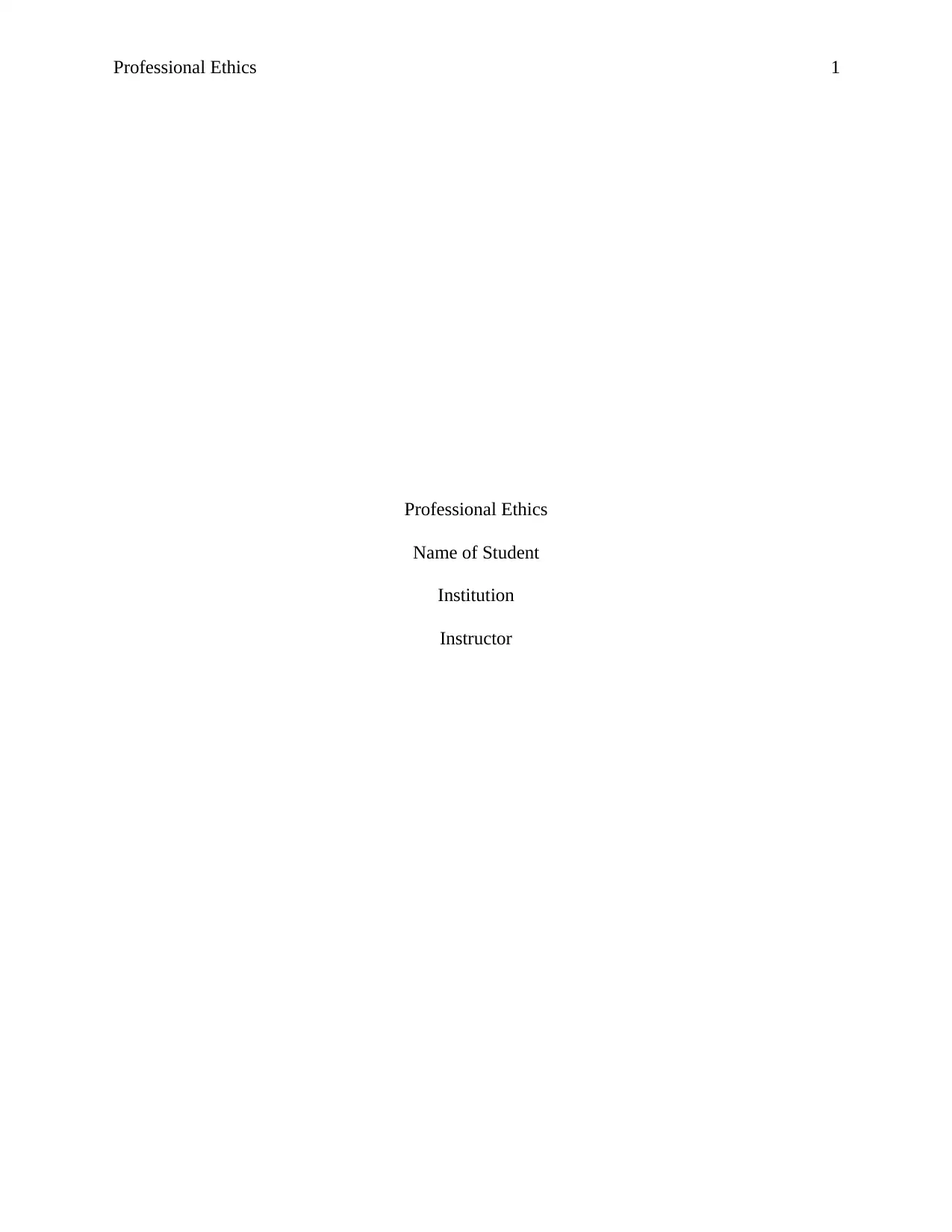
Professional Ethics 1
Professional Ethics
Name of Student
Institution
Instructor
Professional Ethics
Name of Student
Institution
Instructor
Paraphrase This Document
Need a fresh take? Get an instant paraphrase of this document with our AI Paraphraser
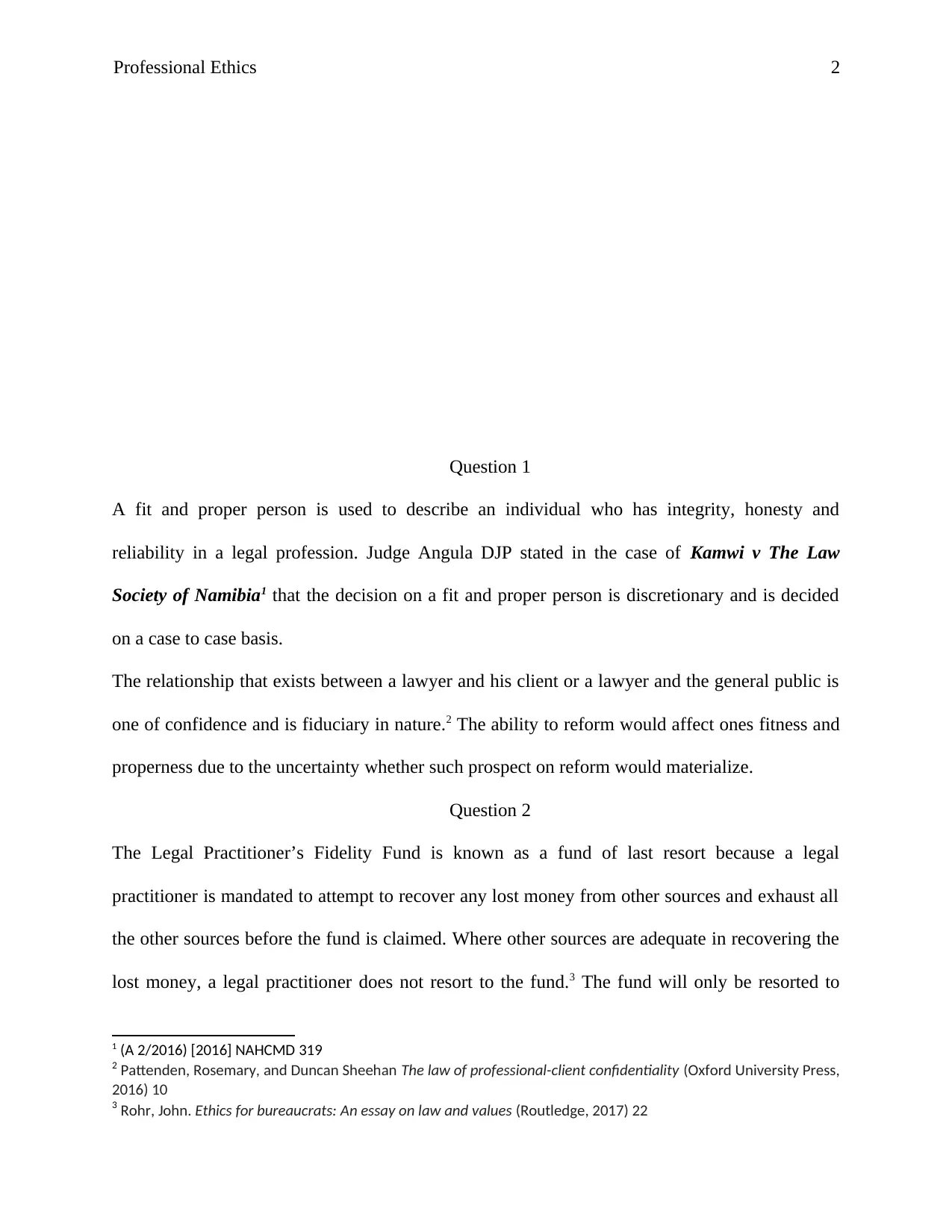
Professional Ethics 2
Question 1
A fit and proper person is used to describe an individual who has integrity, honesty and
reliability in a legal profession. Judge Angula DJP stated in the case of Kamwi v The Law
Society of Namibia1 that the decision on a fit and proper person is discretionary and is decided
on a case to case basis.
The relationship that exists between a lawyer and his client or a lawyer and the general public is
one of confidence and is fiduciary in nature.2 The ability to reform would affect ones fitness and
properness due to the uncertainty whether such prospect on reform would materialize.
Question 2
The Legal Practitioner’s Fidelity Fund is known as a fund of last resort because a legal
practitioner is mandated to attempt to recover any lost money from other sources and exhaust all
the other sources before the fund is claimed. Where other sources are adequate in recovering the
lost money, a legal practitioner does not resort to the fund.3 The fund will only be resorted to
1 (A 2/2016) [2016] NAHCMD 319
2 Pattenden, Rosemary, and Duncan Sheehan The law of professional-client confidentiality (Oxford University Press,
2016) 10
3 Rohr, John. Ethics for bureaucrats: An essay on law and values (Routledge, 2017) 22
Question 1
A fit and proper person is used to describe an individual who has integrity, honesty and
reliability in a legal profession. Judge Angula DJP stated in the case of Kamwi v The Law
Society of Namibia1 that the decision on a fit and proper person is discretionary and is decided
on a case to case basis.
The relationship that exists between a lawyer and his client or a lawyer and the general public is
one of confidence and is fiduciary in nature.2 The ability to reform would affect ones fitness and
properness due to the uncertainty whether such prospect on reform would materialize.
Question 2
The Legal Practitioner’s Fidelity Fund is known as a fund of last resort because a legal
practitioner is mandated to attempt to recover any lost money from other sources and exhaust all
the other sources before the fund is claimed. Where other sources are adequate in recovering the
lost money, a legal practitioner does not resort to the fund.3 The fund will only be resorted to
1 (A 2/2016) [2016] NAHCMD 319
2 Pattenden, Rosemary, and Duncan Sheehan The law of professional-client confidentiality (Oxford University Press,
2016) 10
3 Rohr, John. Ethics for bureaucrats: An essay on law and values (Routledge, 2017) 22
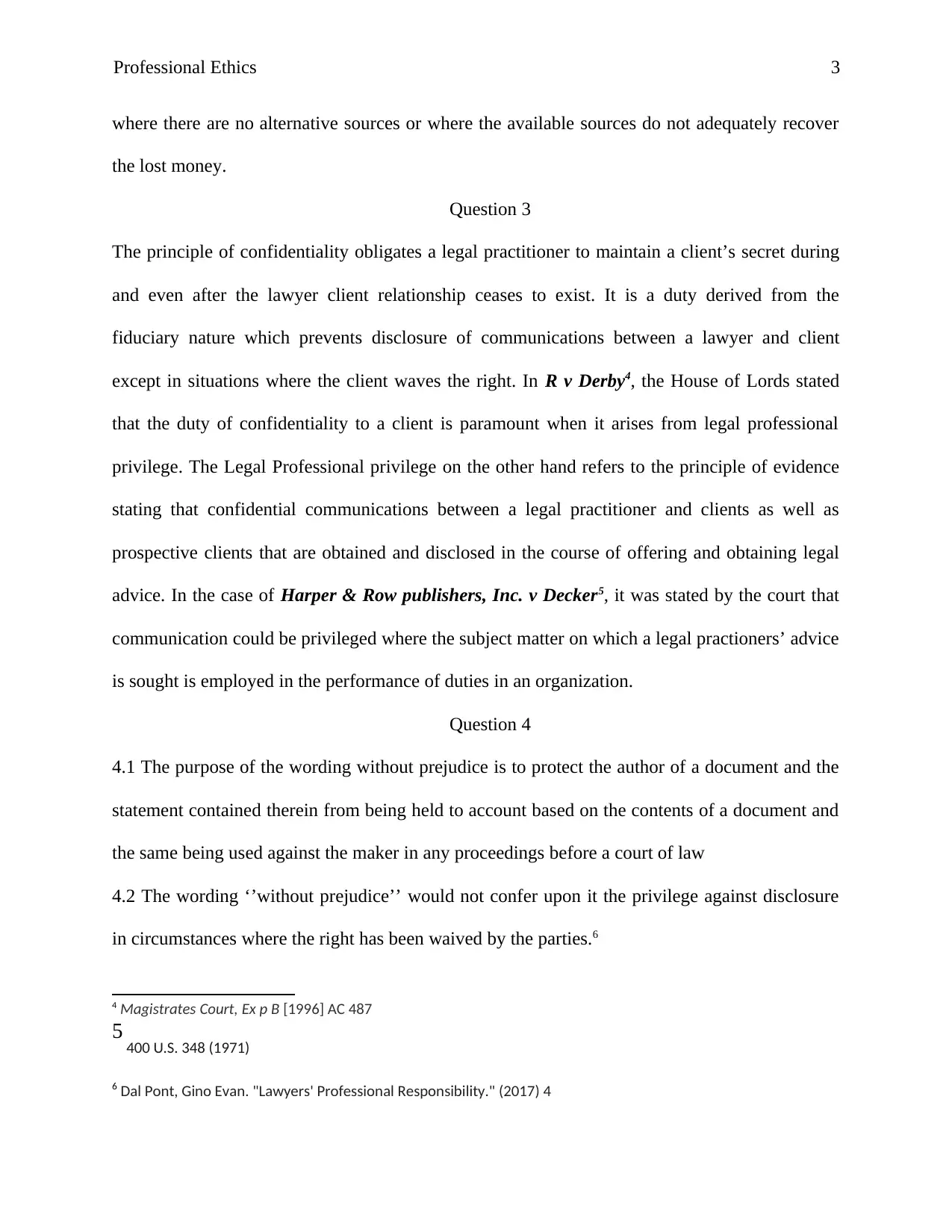
Professional Ethics 3
where there are no alternative sources or where the available sources do not adequately recover
the lost money.
Question 3
The principle of confidentiality obligates a legal practitioner to maintain a client’s secret during
and even after the lawyer client relationship ceases to exist. It is a duty derived from the
fiduciary nature which prevents disclosure of communications between a lawyer and client
except in situations where the client waves the right. In R v Derby4, the House of Lords stated
that the duty of confidentiality to a client is paramount when it arises from legal professional
privilege. The Legal Professional privilege on the other hand refers to the principle of evidence
stating that confidential communications between a legal practitioner and clients as well as
prospective clients that are obtained and disclosed in the course of offering and obtaining legal
advice. In the case of Harper & Row publishers, Inc. v Decker5, it was stated by the court that
communication could be privileged where the subject matter on which a legal practioners’ advice
is sought is employed in the performance of duties in an organization.
Question 4
4.1 The purpose of the wording without prejudice is to protect the author of a document and the
statement contained therein from being held to account based on the contents of a document and
the same being used against the maker in any proceedings before a court of law
4.2 The wording ‘’without prejudice’’ would not confer upon it the privilege against disclosure
in circumstances where the right has been waived by the parties.6
4 Magistrates Court, Ex p B [1996] AC 487
5 400 U.S. 348 (1971)
6 Dal Pont, Gino Evan. "Lawyers' Professional Responsibility." (2017) 4
where there are no alternative sources or where the available sources do not adequately recover
the lost money.
Question 3
The principle of confidentiality obligates a legal practitioner to maintain a client’s secret during
and even after the lawyer client relationship ceases to exist. It is a duty derived from the
fiduciary nature which prevents disclosure of communications between a lawyer and client
except in situations where the client waves the right. In R v Derby4, the House of Lords stated
that the duty of confidentiality to a client is paramount when it arises from legal professional
privilege. The Legal Professional privilege on the other hand refers to the principle of evidence
stating that confidential communications between a legal practitioner and clients as well as
prospective clients that are obtained and disclosed in the course of offering and obtaining legal
advice. In the case of Harper & Row publishers, Inc. v Decker5, it was stated by the court that
communication could be privileged where the subject matter on which a legal practioners’ advice
is sought is employed in the performance of duties in an organization.
Question 4
4.1 The purpose of the wording without prejudice is to protect the author of a document and the
statement contained therein from being held to account based on the contents of a document and
the same being used against the maker in any proceedings before a court of law
4.2 The wording ‘’without prejudice’’ would not confer upon it the privilege against disclosure
in circumstances where the right has been waived by the parties.6
4 Magistrates Court, Ex p B [1996] AC 487
5 400 U.S. 348 (1971)
6 Dal Pont, Gino Evan. "Lawyers' Professional Responsibility." (2017) 4
⊘ This is a preview!⊘
Do you want full access?
Subscribe today to unlock all pages.

Trusted by 1+ million students worldwide
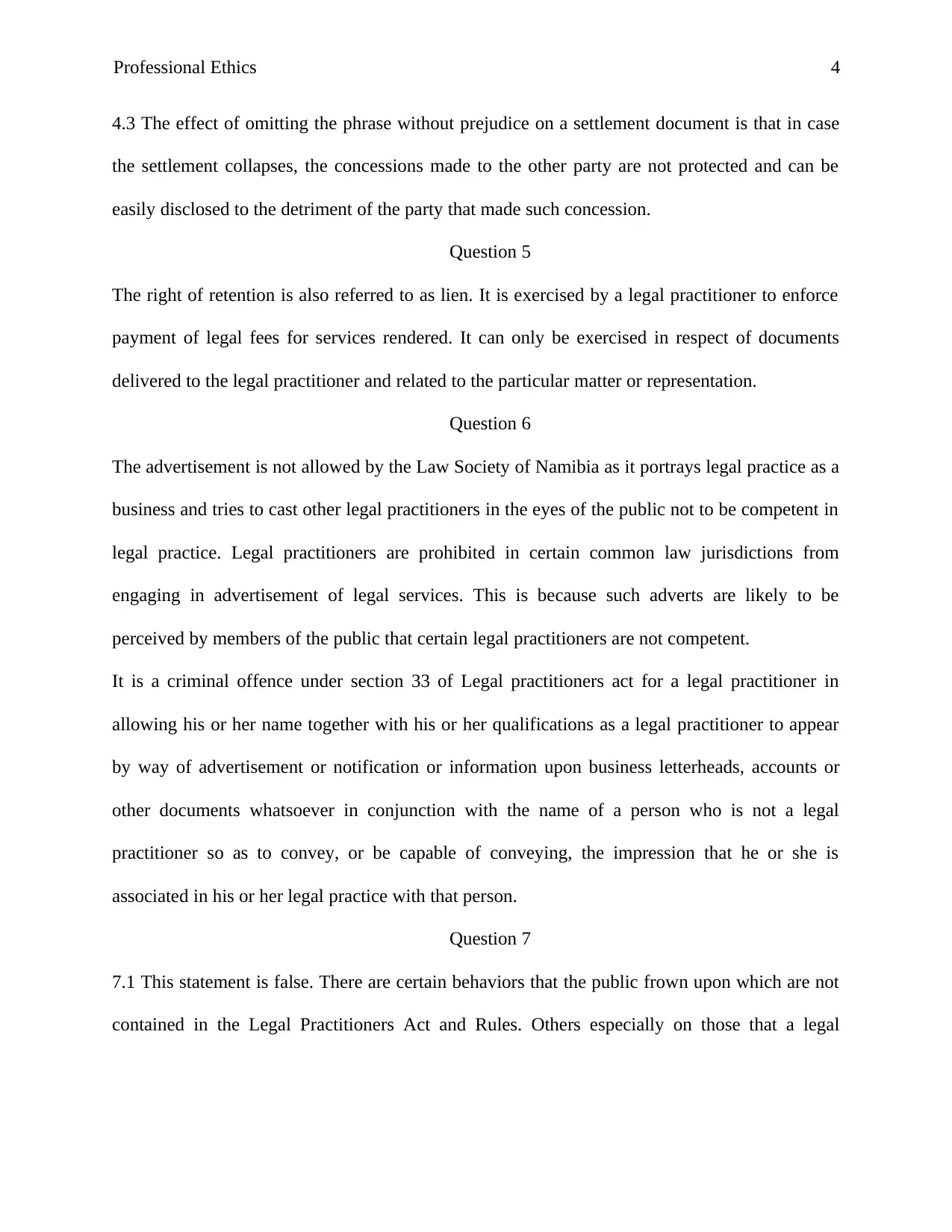
Professional Ethics 4
4.3 The effect of omitting the phrase without prejudice on a settlement document is that in case
the settlement collapses, the concessions made to the other party are not protected and can be
easily disclosed to the detriment of the party that made such concession.
Question 5
The right of retention is also referred to as lien. It is exercised by a legal practitioner to enforce
payment of legal fees for services rendered. It can only be exercised in respect of documents
delivered to the legal practitioner and related to the particular matter or representation.
Question 6
The advertisement is not allowed by the Law Society of Namibia as it portrays legal practice as a
business and tries to cast other legal practitioners in the eyes of the public not to be competent in
legal practice. Legal practitioners are prohibited in certain common law jurisdictions from
engaging in advertisement of legal services. This is because such adverts are likely to be
perceived by members of the public that certain legal practitioners are not competent.
It is a criminal offence under section 33 of Legal practitioners act for a legal practitioner in
allowing his or her name together with his or her qualifications as a legal practitioner to appear
by way of advertisement or notification or information upon business letterheads, accounts or
other documents whatsoever in conjunction with the name of a person who is not a legal
practitioner so as to convey, or be capable of conveying, the impression that he or she is
associated in his or her legal practice with that person.
Question 7
7.1 This statement is false. There are certain behaviors that the public frown upon which are not
contained in the Legal Practitioners Act and Rules. Others especially on those that a legal
4.3 The effect of omitting the phrase without prejudice on a settlement document is that in case
the settlement collapses, the concessions made to the other party are not protected and can be
easily disclosed to the detriment of the party that made such concession.
Question 5
The right of retention is also referred to as lien. It is exercised by a legal practitioner to enforce
payment of legal fees for services rendered. It can only be exercised in respect of documents
delivered to the legal practitioner and related to the particular matter or representation.
Question 6
The advertisement is not allowed by the Law Society of Namibia as it portrays legal practice as a
business and tries to cast other legal practitioners in the eyes of the public not to be competent in
legal practice. Legal practitioners are prohibited in certain common law jurisdictions from
engaging in advertisement of legal services. This is because such adverts are likely to be
perceived by members of the public that certain legal practitioners are not competent.
It is a criminal offence under section 33 of Legal practitioners act for a legal practitioner in
allowing his or her name together with his or her qualifications as a legal practitioner to appear
by way of advertisement or notification or information upon business letterheads, accounts or
other documents whatsoever in conjunction with the name of a person who is not a legal
practitioner so as to convey, or be capable of conveying, the impression that he or she is
associated in his or her legal practice with that person.
Question 7
7.1 This statement is false. There are certain behaviors that the public frown upon which are not
contained in the Legal Practitioners Act and Rules. Others especially on those that a legal
Paraphrase This Document
Need a fresh take? Get an instant paraphrase of this document with our AI Paraphraser
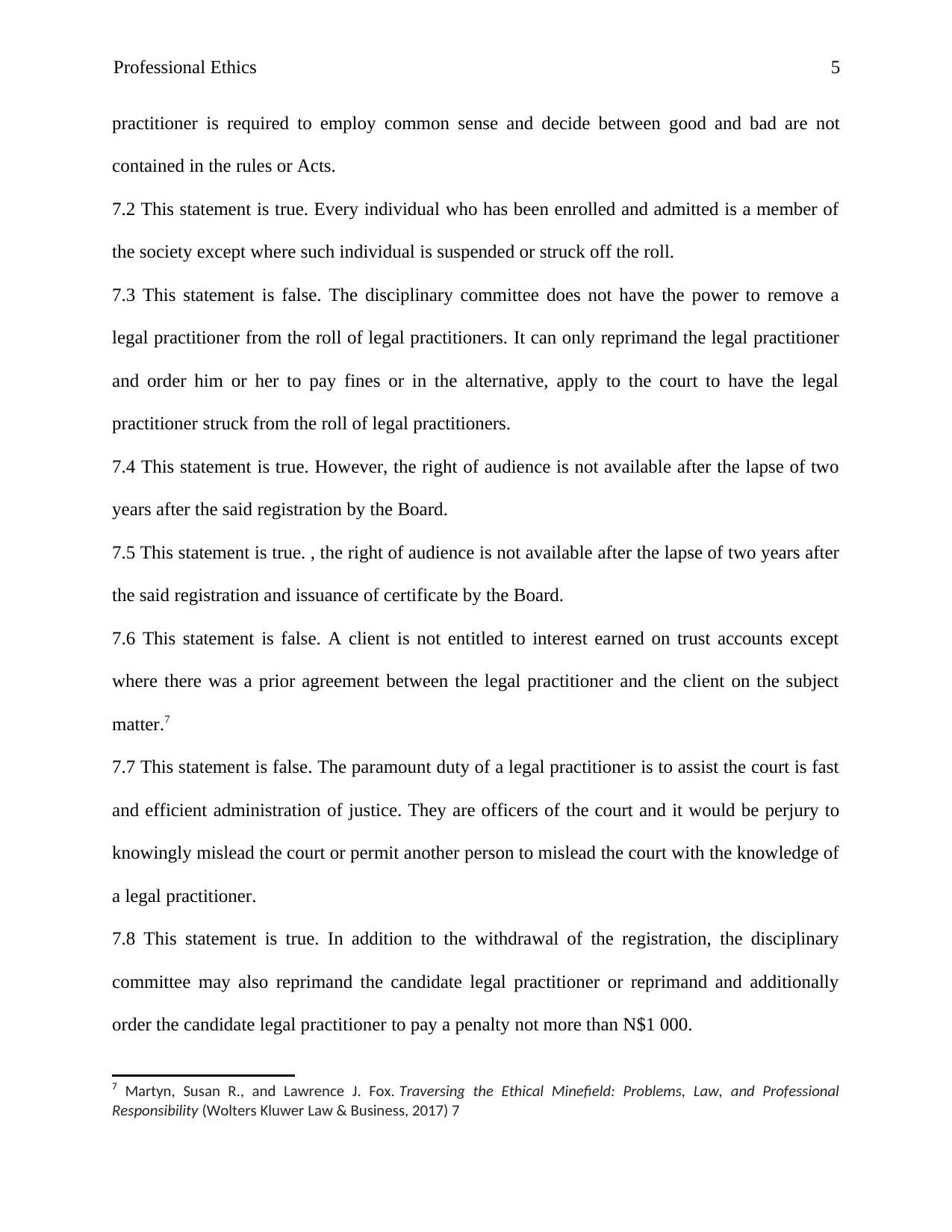
Professional Ethics 5
practitioner is required to employ common sense and decide between good and bad are not
contained in the rules or Acts.
7.2 This statement is true. Every individual who has been enrolled and admitted is a member of
the society except where such individual is suspended or struck off the roll.
7.3 This statement is false. The disciplinary committee does not have the power to remove a
legal practitioner from the roll of legal practitioners. It can only reprimand the legal practitioner
and order him or her to pay fines or in the alternative, apply to the court to have the legal
practitioner struck from the roll of legal practitioners.
7.4 This statement is true. However, the right of audience is not available after the lapse of two
years after the said registration by the Board.
7.5 This statement is true. , the right of audience is not available after the lapse of two years after
the said registration and issuance of certificate by the Board.
7.6 This statement is false. A client is not entitled to interest earned on trust accounts except
where there was a prior agreement between the legal practitioner and the client on the subject
matter.7
7.7 This statement is false. The paramount duty of a legal practitioner is to assist the court is fast
and efficient administration of justice. They are officers of the court and it would be perjury to
knowingly mislead the court or permit another person to mislead the court with the knowledge of
a legal practitioner.
7.8 This statement is true. In addition to the withdrawal of the registration, the disciplinary
committee may also reprimand the candidate legal practitioner or reprimand and additionally
order the candidate legal practitioner to pay a penalty not more than N$1 000.
7 Martyn, Susan R., and Lawrence J. Fox. Traversing the Ethical Minefield: Problems, Law, and Professional
Responsibility (Wolters Kluwer Law & Business, 2017) 7
practitioner is required to employ common sense and decide between good and bad are not
contained in the rules or Acts.
7.2 This statement is true. Every individual who has been enrolled and admitted is a member of
the society except where such individual is suspended or struck off the roll.
7.3 This statement is false. The disciplinary committee does not have the power to remove a
legal practitioner from the roll of legal practitioners. It can only reprimand the legal practitioner
and order him or her to pay fines or in the alternative, apply to the court to have the legal
practitioner struck from the roll of legal practitioners.
7.4 This statement is true. However, the right of audience is not available after the lapse of two
years after the said registration by the Board.
7.5 This statement is true. , the right of audience is not available after the lapse of two years after
the said registration and issuance of certificate by the Board.
7.6 This statement is false. A client is not entitled to interest earned on trust accounts except
where there was a prior agreement between the legal practitioner and the client on the subject
matter.7
7.7 This statement is false. The paramount duty of a legal practitioner is to assist the court is fast
and efficient administration of justice. They are officers of the court and it would be perjury to
knowingly mislead the court or permit another person to mislead the court with the knowledge of
a legal practitioner.
7.8 This statement is true. In addition to the withdrawal of the registration, the disciplinary
committee may also reprimand the candidate legal practitioner or reprimand and additionally
order the candidate legal practitioner to pay a penalty not more than N$1 000.
7 Martyn, Susan R., and Lawrence J. Fox. Traversing the Ethical Minefield: Problems, Law, and Professional
Responsibility (Wolters Kluwer Law & Business, 2017) 7
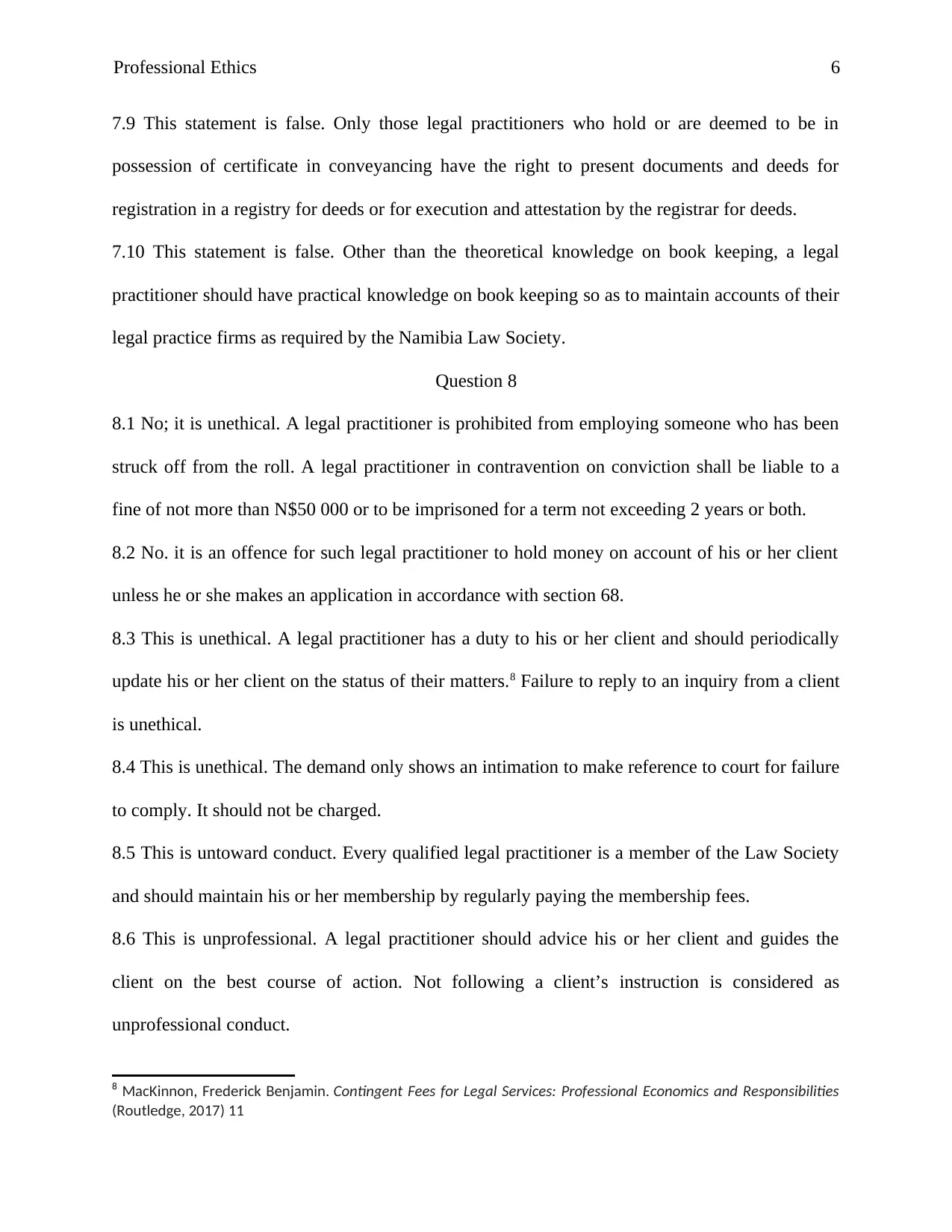
Professional Ethics 6
7.9 This statement is false. Only those legal practitioners who hold or are deemed to be in
possession of certificate in conveyancing have the right to present documents and deeds for
registration in a registry for deeds or for execution and attestation by the registrar for deeds.
7.10 This statement is false. Other than the theoretical knowledge on book keeping, a legal
practitioner should have practical knowledge on book keeping so as to maintain accounts of their
legal practice firms as required by the Namibia Law Society.
Question 8
8.1 No; it is unethical. A legal practitioner is prohibited from employing someone who has been
struck off from the roll. A legal practitioner in contravention on conviction shall be liable to a
fine of not more than N$50 000 or to be imprisoned for a term not exceeding 2 years or both.
8.2 No. it is an offence for such legal practitioner to hold money on account of his or her client
unless he or she makes an application in accordance with section 68.
8.3 This is unethical. A legal practitioner has a duty to his or her client and should periodically
update his or her client on the status of their matters.8 Failure to reply to an inquiry from a client
is unethical.
8.4 This is unethical. The demand only shows an intimation to make reference to court for failure
to comply. It should not be charged.
8.5 This is untoward conduct. Every qualified legal practitioner is a member of the Law Society
and should maintain his or her membership by regularly paying the membership fees.
8.6 This is unprofessional. A legal practitioner should advice his or her client and guides the
client on the best course of action. Not following a client’s instruction is considered as
unprofessional conduct.
8 MacKinnon, Frederick Benjamin. Contingent Fees for Legal Services: Professional Economics and Responsibilities
(Routledge, 2017) 11
7.9 This statement is false. Only those legal practitioners who hold or are deemed to be in
possession of certificate in conveyancing have the right to present documents and deeds for
registration in a registry for deeds or for execution and attestation by the registrar for deeds.
7.10 This statement is false. Other than the theoretical knowledge on book keeping, a legal
practitioner should have practical knowledge on book keeping so as to maintain accounts of their
legal practice firms as required by the Namibia Law Society.
Question 8
8.1 No; it is unethical. A legal practitioner is prohibited from employing someone who has been
struck off from the roll. A legal practitioner in contravention on conviction shall be liable to a
fine of not more than N$50 000 or to be imprisoned for a term not exceeding 2 years or both.
8.2 No. it is an offence for such legal practitioner to hold money on account of his or her client
unless he or she makes an application in accordance with section 68.
8.3 This is unethical. A legal practitioner has a duty to his or her client and should periodically
update his or her client on the status of their matters.8 Failure to reply to an inquiry from a client
is unethical.
8.4 This is unethical. The demand only shows an intimation to make reference to court for failure
to comply. It should not be charged.
8.5 This is untoward conduct. Every qualified legal practitioner is a member of the Law Society
and should maintain his or her membership by regularly paying the membership fees.
8.6 This is unprofessional. A legal practitioner should advice his or her client and guides the
client on the best course of action. Not following a client’s instruction is considered as
unprofessional conduct.
8 MacKinnon, Frederick Benjamin. Contingent Fees for Legal Services: Professional Economics and Responsibilities
(Routledge, 2017) 11
⊘ This is a preview!⊘
Do you want full access?
Subscribe today to unlock all pages.

Trusted by 1+ million students worldwide
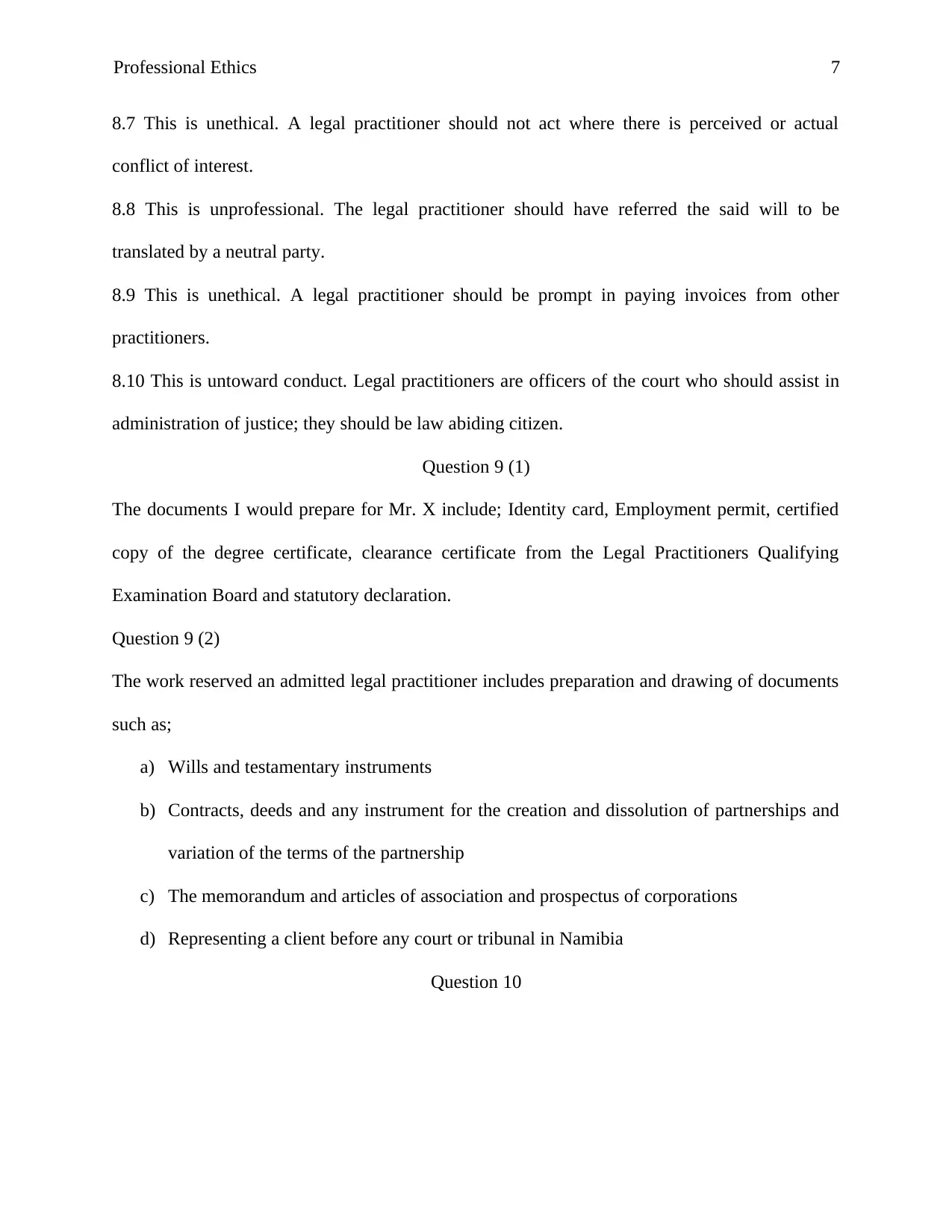
Professional Ethics 7
8.7 This is unethical. A legal practitioner should not act where there is perceived or actual
conflict of interest.
8.8 This is unprofessional. The legal practitioner should have referred the said will to be
translated by a neutral party.
8.9 This is unethical. A legal practitioner should be prompt in paying invoices from other
practitioners.
8.10 This is untoward conduct. Legal practitioners are officers of the court who should assist in
administration of justice; they should be law abiding citizen.
Question 9 (1)
The documents I would prepare for Mr. X include; Identity card, Employment permit, certified
copy of the degree certificate, clearance certificate from the Legal Practitioners Qualifying
Examination Board and statutory declaration.
Question 9 (2)
The work reserved an admitted legal practitioner includes preparation and drawing of documents
such as;
a) Wills and testamentary instruments
b) Contracts, deeds and any instrument for the creation and dissolution of partnerships and
variation of the terms of the partnership
c) The memorandum and articles of association and prospectus of corporations
d) Representing a client before any court or tribunal in Namibia
Question 10
8.7 This is unethical. A legal practitioner should not act where there is perceived or actual
conflict of interest.
8.8 This is unprofessional. The legal practitioner should have referred the said will to be
translated by a neutral party.
8.9 This is unethical. A legal practitioner should be prompt in paying invoices from other
practitioners.
8.10 This is untoward conduct. Legal practitioners are officers of the court who should assist in
administration of justice; they should be law abiding citizen.
Question 9 (1)
The documents I would prepare for Mr. X include; Identity card, Employment permit, certified
copy of the degree certificate, clearance certificate from the Legal Practitioners Qualifying
Examination Board and statutory declaration.
Question 9 (2)
The work reserved an admitted legal practitioner includes preparation and drawing of documents
such as;
a) Wills and testamentary instruments
b) Contracts, deeds and any instrument for the creation and dissolution of partnerships and
variation of the terms of the partnership
c) The memorandum and articles of association and prospectus of corporations
d) Representing a client before any court or tribunal in Namibia
Question 10
Paraphrase This Document
Need a fresh take? Get an instant paraphrase of this document with our AI Paraphraser
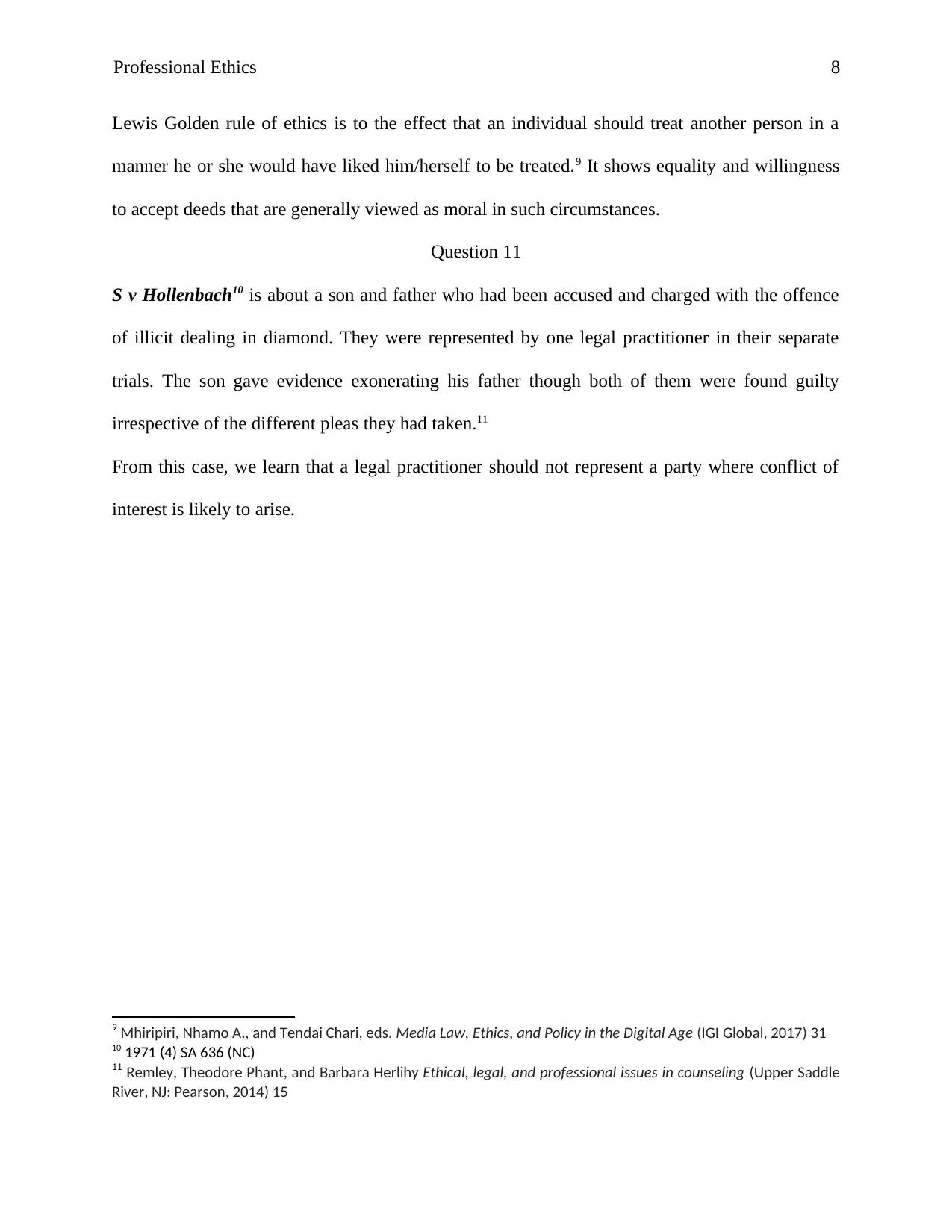
Professional Ethics 8
Lewis Golden rule of ethics is to the effect that an individual should treat another person in a
manner he or she would have liked him/herself to be treated.9 It shows equality and willingness
to accept deeds that are generally viewed as moral in such circumstances.
Question 11
S v Hollenbach10 is about a son and father who had been accused and charged with the offence
of illicit dealing in diamond. They were represented by one legal practitioner in their separate
trials. The son gave evidence exonerating his father though both of them were found guilty
irrespective of the different pleas they had taken.11
From this case, we learn that a legal practitioner should not represent a party where conflict of
interest is likely to arise.
9 Mhiripiri, Nhamo A., and Tendai Chari, eds. Media Law, Ethics, and Policy in the Digital Age (IGI Global, 2017) 31
10 1971 (4) SA 636 (NC)
11 Remley, Theodore Phant, and Barbara Herlihy Ethical, legal, and professional issues in counseling (Upper Saddle
River, NJ: Pearson, 2014) 15
Lewis Golden rule of ethics is to the effect that an individual should treat another person in a
manner he or she would have liked him/herself to be treated.9 It shows equality and willingness
to accept deeds that are generally viewed as moral in such circumstances.
Question 11
S v Hollenbach10 is about a son and father who had been accused and charged with the offence
of illicit dealing in diamond. They were represented by one legal practitioner in their separate
trials. The son gave evidence exonerating his father though both of them were found guilty
irrespective of the different pleas they had taken.11
From this case, we learn that a legal practitioner should not represent a party where conflict of
interest is likely to arise.
9 Mhiripiri, Nhamo A., and Tendai Chari, eds. Media Law, Ethics, and Policy in the Digital Age (IGI Global, 2017) 31
10 1971 (4) SA 636 (NC)
11 Remley, Theodore Phant, and Barbara Herlihy Ethical, legal, and professional issues in counseling (Upper Saddle
River, NJ: Pearson, 2014) 15
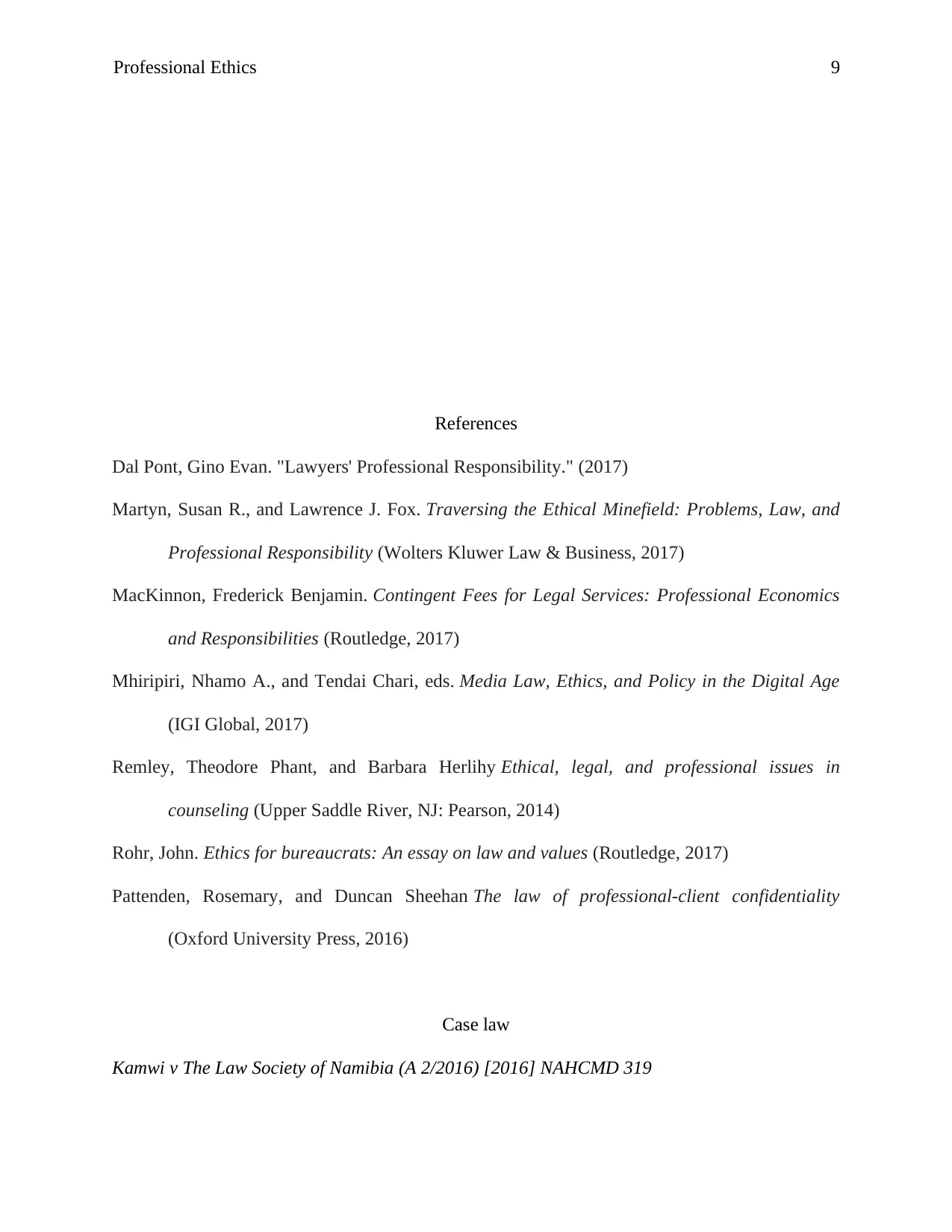
Professional Ethics 9
References
Dal Pont, Gino Evan. "Lawyers' Professional Responsibility." (2017)
Martyn, Susan R., and Lawrence J. Fox. Traversing the Ethical Minefield: Problems, Law, and
Professional Responsibility (Wolters Kluwer Law & Business, 2017)
MacKinnon, Frederick Benjamin. Contingent Fees for Legal Services: Professional Economics
and Responsibilities (Routledge, 2017)
Mhiripiri, Nhamo A., and Tendai Chari, eds. Media Law, Ethics, and Policy in the Digital Age
(IGI Global, 2017)
Remley, Theodore Phant, and Barbara Herlihy Ethical, legal, and professional issues in
counseling (Upper Saddle River, NJ: Pearson, 2014)
Rohr, John. Ethics for bureaucrats: An essay on law and values (Routledge, 2017)
Pattenden, Rosemary, and Duncan Sheehan The law of professional-client confidentiality
(Oxford University Press, 2016)
Case law
Kamwi v The Law Society of Namibia (A 2/2016) [2016] NAHCMD 319
References
Dal Pont, Gino Evan. "Lawyers' Professional Responsibility." (2017)
Martyn, Susan R., and Lawrence J. Fox. Traversing the Ethical Minefield: Problems, Law, and
Professional Responsibility (Wolters Kluwer Law & Business, 2017)
MacKinnon, Frederick Benjamin. Contingent Fees for Legal Services: Professional Economics
and Responsibilities (Routledge, 2017)
Mhiripiri, Nhamo A., and Tendai Chari, eds. Media Law, Ethics, and Policy in the Digital Age
(IGI Global, 2017)
Remley, Theodore Phant, and Barbara Herlihy Ethical, legal, and professional issues in
counseling (Upper Saddle River, NJ: Pearson, 2014)
Rohr, John. Ethics for bureaucrats: An essay on law and values (Routledge, 2017)
Pattenden, Rosemary, and Duncan Sheehan The law of professional-client confidentiality
(Oxford University Press, 2016)
Case law
Kamwi v The Law Society of Namibia (A 2/2016) [2016] NAHCMD 319
⊘ This is a preview!⊘
Do you want full access?
Subscribe today to unlock all pages.

Trusted by 1+ million students worldwide
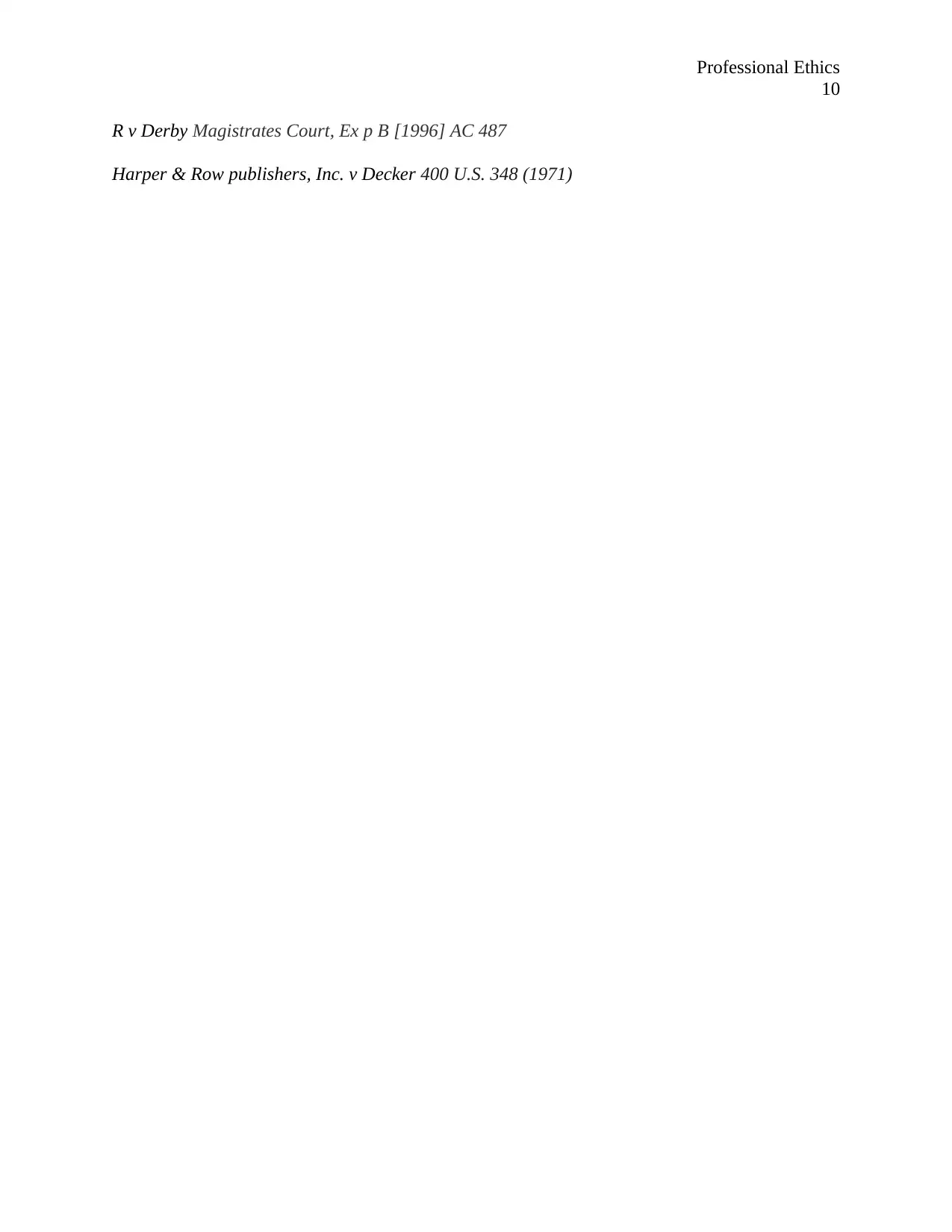
Professional Ethics
10
R v Derby Magistrates Court, Ex p B [1996] AC 487
Harper & Row publishers, Inc. v Decker 400 U.S. 348 (1971)
10
R v Derby Magistrates Court, Ex p B [1996] AC 487
Harper & Row publishers, Inc. v Decker 400 U.S. 348 (1971)
1 out of 10
Your All-in-One AI-Powered Toolkit for Academic Success.
+13062052269
info@desklib.com
Available 24*7 on WhatsApp / Email
![[object Object]](/_next/static/media/star-bottom.7253800d.svg)
Unlock your academic potential
Copyright © 2020–2026 A2Z Services. All Rights Reserved. Developed and managed by ZUCOL.


